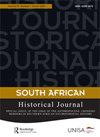在KwaPoyinandi的实验:非洲人与Edendale地方卫生委员会和地区公共卫生区的接触,1942年至1957年
IF 1
3区 历史学
Q1 HISTORY
引用次数: 0
摘要
摘要KwaPoyinandi是祖鲁语中地方卫生委员会(LHC)的术语,这是一种独特但现在鲜为人知的地方当局形式,从1942年到1974年,它管理着Edendale的自由保有社区以及邻近的农场、乡镇和非正规住区。其早期任务是在社会医学范式(关注健康的社会决定因素的初级卫生保健)范围内恢复曾经繁荣的社区,并承诺向自治过渡。直到20世纪50年代末,实现了这一任务的“重大工作”,包括成立了一个由非洲人占多数的多种族咨询委员会和一名非洲主席。KwaPoyinandi也在比南非大多数(如果不是全部的话)主要城市中心更长的时间里反抗国家种族隔离趋势,直到20世纪70年代,南非的人口种族多元化。由于与种族隔离制度不兼容,该实验受到阻碍,最终被关闭。我认为,非洲人以多种复杂的方式积极参与KwaPoyinandi是其早期相对成功的一个重要因素,这段历史为当前围绕振兴南非周边城市社区的辩论提供了相关的见解。本文章由计算机程序翻译,如有差异,请以英文原文为准。
Experiment at KwaPoyinandi: African Engagement with the Local Health Commission of the Edendale and District Public Health Area, 1942–c.1957
ABSTRACT KwaPoyinandi was the Zulu term for the Local Health Commission (LHC), a unique but now little-remembered form of local authority that governed the freehold community of Edendale and contiguous farms, townships, and informal settlements from 1942 to 1974. Its early mandate was to rehabilitate the once prosperous community within the social medicine paradigm (primary health care attentive to the social determinants of health) and with the promise of transition to self-governance. Through to the late 1950s, ‘monumental work’ toward that mandate was achieved, including a multiracial advisory board with an African majority and an African chair. KwaPoyinandi also bucked the national apartheid trend for longer than most, if not all, major urban centres in South Africa, with a racially diverse population well into the 1970s. The experiment was hamstrung and ultimately shut down due to its incompatibility with apartheid. I argue that Africans’ active engagement with KwaPoyinandi in diverse and complex ways was an important factor in its early relative success and that this history provides insights pertinent to current debates around the revitalisation of peri-urban communities around South Africa.
求助全文
通过发布文献求助,成功后即可免费获取论文全文。
去求助
来源期刊

South African Historical Journal
Multiple-
CiteScore
0.70
自引率
0.00%
发文量
37
期刊介绍:
Over the past 40 years, the South African Historical Journal has become renowned and internationally regarded as a premier history journal published in South Africa, promoting significant historical scholarship on the country as well as the southern African region. The journal, which is linked to the Southern African Historical Society, has provided a high-quality medium for original thinking about South African history and has thus shaped - and continues to contribute towards defining - the historiography of the region.
 求助内容:
求助内容: 应助结果提醒方式:
应助结果提醒方式:


